In this article, you’ll discover the following:
- Short-form video content remains a top priority, leveraging platforms like TikTok, Instagram Reels, and YouTube Shorts to capture shrinking attention spans.
- High-value, purposeful content is essential, as consumers increasingly demand depth, usefulness, and authentic insights—not just promotional material.
- Search is expanding beyond Google, with users turning to TikTok, YouTube, Reddit, and AI chat tools, requiring brands to optimize across varied platforms.
- AI and human creativity must work hand-in-hand, where AI handles research and efficiency, but human insight ensures emotional connection and originality.
- Content atomization is booming, breaking big content (like eBooks) into smaller pieces—blogs, videos, or social posts—to maximize reach and ROI.
When it comes to content marketing, staying abreast of emerging trends is paramount for businesses aiming to use content marketing to boost sales, enhance visibility, and engage with their target audience effectively.
As online platforms evolve and consumer behaviors shift, new trends and strategies continue to emerge, reshaping the world of content marketing.
From leveraging data analytics to inform content strategies to harnessing the power of search engine optimization (SEO) for enhanced discoverability, businesses have an array of tools at their disposal to elevate their content marketing efforts.
Whether it’s through compelling blog posts, engaging social media content, or informative podcasts, content remains king in today’s digital age.
Like anything else in ecommerce, marketers who continue to use the same strategy for content marketing that they used a year ago can quickly fall behind the competition.
The history of content marketing illustrates that today’s content marketing looks much different than it did in the past. What’s more, it’ll only continue to evolve as new technology arrives and consumers’ wants and needs change.
Perhaps you’re handling this area of your business, or maybe you have a team of people managing it for you instead. Either way, it’s advantageous for you to have a decent grasp of what the current landscape looks like for content marketers.
If you’ve only recently launched your store or are new to content marketing for ecommerce, you may not have yet noticed how quickly things can change in this area, just like with digital marketing trends.
In fact, even those who know all about how content marketing works and are more experienced in this crucial aspect of ecommerce often find that developing a stellar content marketing strategy involves some trial and error.
Nevertheless, seeing what may likely be the horizon can help you decide how to best create content going forward. Here are several of the most important content marketing trends that you should keep in mind for this year and beyond!
Table of contents
- 1. Short-form video content continues to be a priority
- 2. High-value content is more important than ever
- 3. Search evolves beyond Google
- 4. User experience is more heavily weighted
- 5. Originality and creativity are increasingly important
- 6. There’s a greater focus on the purpose-driven customer
- 7. Brands are diversifying their content formats
- 8. Thought leadership via personal branding is becoming more prevalent
- 9. Content collaboration is growing
- 10. Content atomization is booming
- 11. AI is used in conjunction with human creativity for content creation
- 12. Podcasts are growing in popularity
- 13. Live video streaming continues to be in demand
- 14. Email newsletters play a key role in content marketing
- 15. Brands are heading to online communities to generate ideas
1. Short-form video content continues to be a priority
Short-form video content refers to concise videos typically ranging from a few seconds to a few minutes in length, designed to capture attention quickly and convey a message efficiently.
It's one of the top content marketing trends for brands due to its ability to engage audiences effectively in today’s fast-paced digital landscape.
Sharing short-form videos is a great way to capitalize on shrinking attention spans, mobile usage, and the popularity of social media platforms like TikTok, Instagram Reels, and YouTube Shorts.
@anthropologieofficial say hi (drated) to our NEW & *exclusive* @HYDROJUG prints \ud83d\ude0d\ud83d\udc4b #HydroJug #NewArrivals #WaterBottle \u266c original sound - Anthropologie
Example of short-form video content on TikTok by Anthropologie
To incorporate this trend into your content marketing strategy and create compelling short-form videos for your brand, consider these tips:
- Keep it concise: Get to the point quickly to maintain viewer interest.
- Be visually appealing: Use vibrant visuals, catchy music, and eye-catching effects.
- Tell a story: Craft a narrative that resonates with your audience and communicates your brand message.
- Optimize for mobile: Ensure your videos are optimized for viewing on smartphones and tablets.
- Add a call to action: Prompt viewers to engage with your brand by including clear calls to action.
2. High-value content is more important than ever
Consumers are beset with all kinds of different content on a daily basis.
Couple that with the extremely low attention spans that many people have while browsing the internet, and it’s no surprise that excellent content is essential for brands looking to achieve success in ecommerce.
This is likely to become even more critical in the near future as the number of online stores continues to multiply.
Shoppers are going to be choosier when it comes to which businesses they buy from. In addition, your site visitors are going to be less willing to give you their contact information to sign up for access to content, such as an eBook, if they’re not confident in your ability to deliver.
If you find yourself struggling to create content that actually has a noticeable effect on boosting sales, you’re not alone.
A survey done by Statista in 2019 found that 54% and 52% of respondents stated that their biggest challenges in content marketing involved coming up with content that generates qualified leads and increases traffic, respectively.
To ensure that you’re giving your audience the most value possible, you might need to put even more effort into the market research you perform before you create your content.
Example of helpful content that provides value by Chewy
Really delve into what issues your audience might be struggling with and determine how you can help them find solutions.
Remember that to be successful with content marketing, you must go beyond advertising the advantages of your product. Consider how the content you share can assist your audience in the long run.
3. Search evolves beyond Google
Today, search is evolving far beyond Google, reshaping how consumers discover and engage with content.
Platforms like TikTok, YouTube, Reddit, and AI-powered tools such as ChatGPT and Perplexity are becoming popular alternatives for search, especially among younger audiences. 3
Instead of typing keywords into a traditional search engine, users now seek conversational answers, video explainers, or peer recommendations directly from these platforms. This shift means brands must optimize content for multiple channels—not just Google SEO.
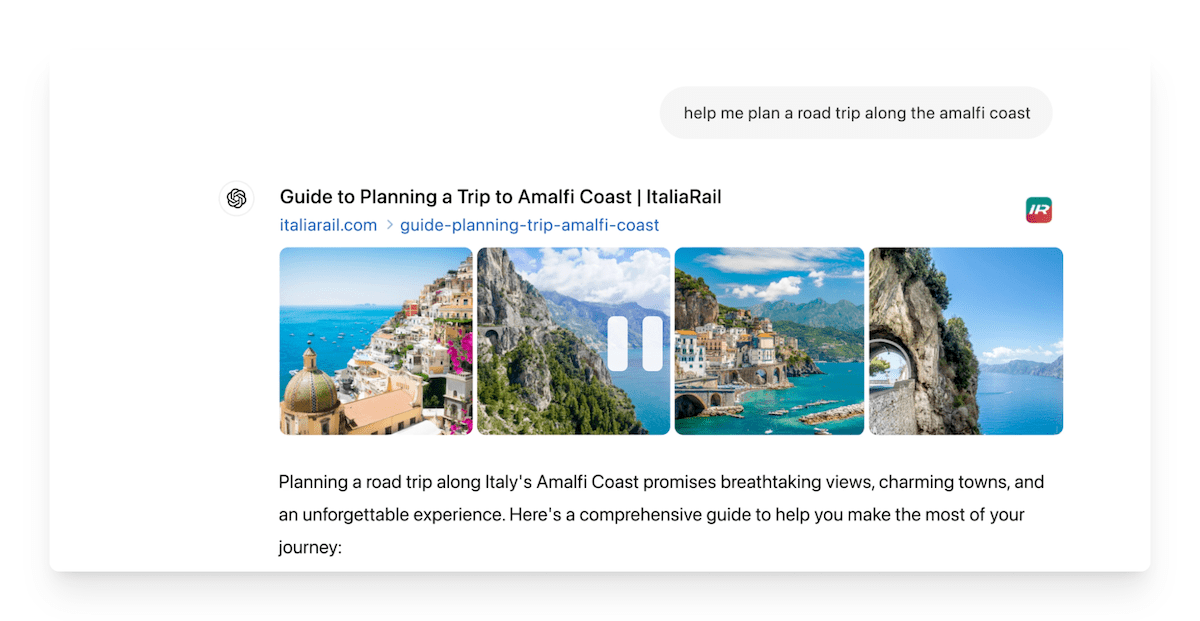
Source: OpenAI’s ChatGPT Search
Short-form videos, discussion threads, and AI-friendly content are crucial for visibility. It also calls for adapting to platform-specific algorithms and formats.
This evolution offers your brand more diverse touchpoints with your audience but also demands a more agile, multi-platform content strategy.
Being discoverable now means showing up in the places your audience actually searches—not just on search engines, but wherever they consume content and seek trusted information.
4. User experience is more heavily weighted
Many content creators currently opt to cater strictly to Google when deciding what information to post and how to share it. This is especially the case when they’re working on creating content for search engine optimization (SEO).
While it’s still going to be important for you to optimize your content for keywords, there are other factors that you should consider if you haven’t already started.
This is because, as noted by Search Engine Journal, Google has begun placing greater weight on the complete user experience that websites offer, examining their Core Web Vitals, and favoring those that do well with this aspect.
What does this mean for your online store? Well, you’ll want to be sure that your website loads quickly and has a design that’s easy for visitors to navigate.
Fortunately, when you use WiziShop’s ecommerce website builder to launch your online store, you’ll be able to create your site in the super speedy, mobile-responsive AMP format!
You’ll also be able to choose from a wide range of templates to design a beautiful homepage that suits your brand and keeps your potential customers in mind.
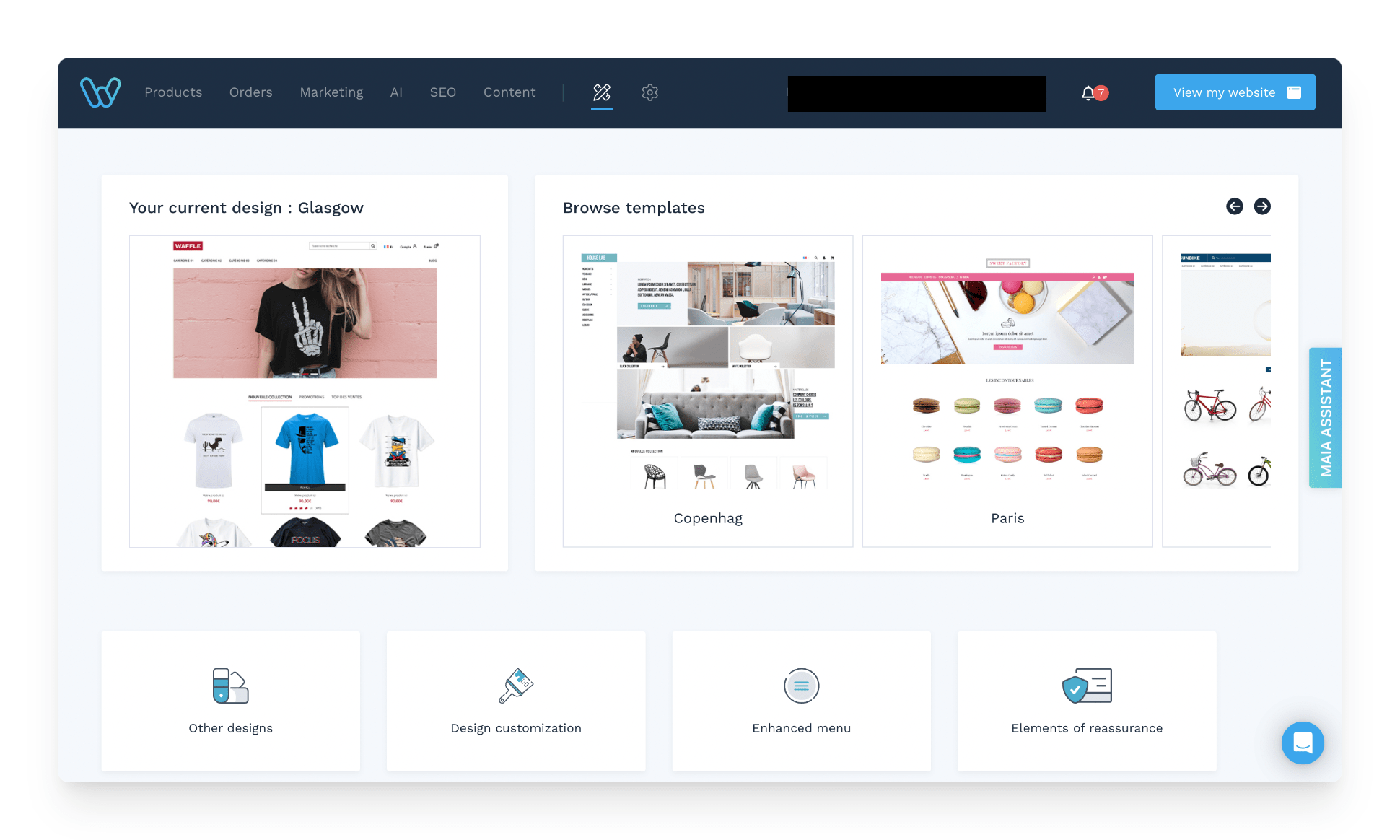
Take advantage of a 7-day free trial and sign up today!
Try WiziShop free for 7 days
THE EASIEST NO-CODE ECOMMERCE SOLUTION✅ No credit card required
✅ Access to all features
✅ No commitment
5. Originality and creativity are increasingly important
These days, it’s not always easy for businesses to create fresh content on their own that stands out from the competition.
In addition, as the aim of content marketing is to provide an audience with engaging, useful information, your content needs to do more than discuss your product’s benefits.
For this reason, companies are going to have to get a little more creative with their content and what information they share. By performing original research, you can supply your audience with a unique perspective that they can’t get elsewhere.
Drunk Elephant founder Tiffany Masterson providing the backstory of one of the company’s hit products
Remember that even if you’re just starting out in ecommerce and have a limited marketing budget, you’re not limited in creativity!
If you don’t consider yourself to be a particularly creative person, consider holding short brainstorm sessions, either alone or with other people to get some new ideas flowing.
6. There’s a greater focus on the purpose-driven customer
More shoppers have started paying attention to how brands approach (or avoid) various issues. They want to know that the brands with whom they do business care more about gaining sales and are invested in making the world a better place.
You don’t have to be passionate about every topic out there and try to solve every global problem that occurs. However, note that your current and potential customers will take note of your messaging regarding societal issues.
Patagonia highlighting the importance of nonviolent direct action
In fact, if you miss out on addressing a certain matter that’s important to them, they may decide to shop elsewhere.
The “purpose-driven customer” is not just a passing trend, either. Businesses must shift their way of thinking to a mindset that goes beyond just looking out for their bottom line and apply this to all aspects of their business, including content marketing.
They also need to ensure that they’re authentic in their approach, as customers can easily sense when a message isn’t genuine.
7. Brands are diversifying their content formats
Today, many brands are trying a range of content formats to aid them in reaching wider audiences and catering to different consumption preferences. Instead of relying solely on blogs or videos, brands are creating multi-format content to boost engagement, SEO, and accessibility.
This strategy allows them to repurpose ideas across platforms, extend the life of campaigns, and connect with users at various stages of the customer journey.
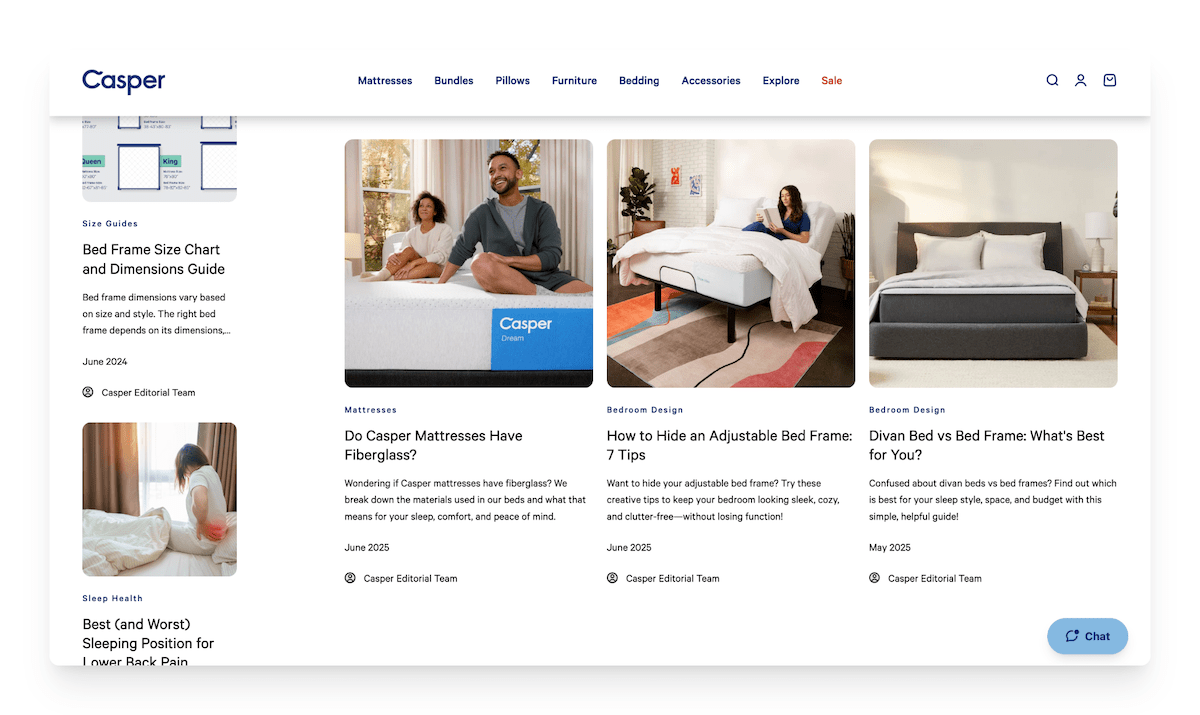
Articles on the Casper blog
Example of an Instagram post by Casper
For instance, a single product launch might include a blog post, a short video, and a social media carousel, each serving a unique purpose.
While the best types of content marketing for your business will vary according to your budget as well as your objectives, here are a few formats worth exploring:
- Blog posts: Articles on your blog are great for SEO and in-depth explanations.
- Videos: Video content is ideal for storytelling and product demos.
- Podcasts: Effective for long-form discussions and building loyalty, podcasts have seen major growth in recent years.
- Infographics: These visual tools are useful for simplifying complex data visually.
- Social media posts: Content on social networks is best for engagement and quick updates.
- Ebooks/Whitepapers: This type of content can assist with lead generation and thought leadership.
- Webinars: A form of educational content, webinars are perfect for live interaction and expert insights.
8. Thought leadership via personal branding is becoming more prevalent
Consumers increasingly trust individuals over faceless corporations, making the personal voices of founders, executives, and employees more influential than ever.
Platforms like LinkedIn, X (formerly Twitter), and podcasts are key spaces where industry experts share insights, opinions, and behind-the-scenes content to build authority and credibility.
This means encouraging team members—especially leadership—to become active content creators.
When employees showcase their expertise and values, it humanizes the brand and strengthens audience trust. This approach not only drives engagement but also extends the brand’s reach through authentic, relationship-based marketing.
@benfrancis In the early days of Gymshark, I set myself small achievable goals. Each small goal allowed us to slowly grow and evolve into what exists today \ud83e\udd88
\u266c Lights Are On - Instrumental - Edith Whiskers
Gymshark founder Ben Francis
However, it requires a thoughtful strategy, ensuring alignment between individual voices and the brand’s mission.
In a crowded digital landscape, people follow people—so brands that empower their teams to lead with their voice can differentiate themselves and build stronger, more meaningful connections with their audiences.
9. Content collaboration is growing
While you’re bound to come up with tons of great ideas for content to create on your own, it can sometimes help to join forces with another creative mind.
The increasing need for originality and content that really connects with an audience has led many brands to engage in content collaboration.
Content collaboration simply involves working with other people to create content. This can involve collaborating with people both inside and outside of your own organization.
For example, brands will often work with influencers in some capacity for content creation. Influencers are content creators who have developed a rather substantial following on social media platforms or elsewhere and have usually established credibility on a certain subject.
Sephora partnering with influencer @therealdestinymichelle for product promotion
These influencers will endorse or mention the brand’s product on their own social media channels, often after receiving the product at a discounted price or as a gift.
As their thousands of followers view this content, the brand’s marketing reach has the potential to skyrocket!
10. Content atomization is booming
If you haven’t already gotten started with your content marketing strategy, you’ll soon find that creating amazing, high-performing content takes lots of time and effort.
Google’s ever-evolving algorithms have made it so you can’t expect your ecommerce website to do well by cranking out a bunch of mediocre content. You’ll therefore need the amazing content that you share with your audience to be effective and as efficient as possible.
For this reason, many brands have begun incorporating content atomization into their content marketing strategies.
Content atomization is when you take a large piece of existing content or a complex concept and break it down into smaller, more concentrated segments.
@lego Minifigures make for great roommates! \ud83d\udce6 #LEGO #TheOffice #LEGODesigner \u266c FEEL THE GROOVE - Queens Road, Fabian Graetz
Example of content atomization with LEGO’s TikTok series interviewing LEGO designers
This will allow you to get more bang for your buck with the content that you know is already doing well for your business.
Say, for example, that your store sells eco-friendly cleaning products. You may have already written a lengthy eBook on how people can integrate eco-responsible practices into their daily lives.
With content atomization, you could then divide this main subject into specific topics, such as how to use these practices when cooking, cleaning, commuting to work, taking care of pets, and more.
In addition, you could share this content in a variety of formats, such as via blog articles, a series of YouTube videos, Instagram posts, etc. This can help your brand reach a larger audience and keep a great piece of content effective for months or possibly years.
11. AI is used in conjunction human creativity for content creation
As the demand for content that’s increasingly personalized continues to grow, so does the challenge of creating effective content on a regular basis.
Many marketers and content specialists have already started incorporating AI tools in their strategies to make the process of creating content easier and more efficient. This trend is likely to continue well into the future.
However, if your content lacks human insight and is just mass-produced by AI, it’s unlikely to differentiate your brand.
Instead, aim to avail of AI tools to help with research, brainstorm ideas, and make writing more efficient, leading to stronger content and more effective campaigns.
Did you know that when you create your online store using the WiziShop ecommerce platform, you'll have access to very handy AI features that allow you to generate all kinds of text content?
It's true! Generate blog posts, product descriptions, lists of pros and cons, translations, and more in mere seconds.
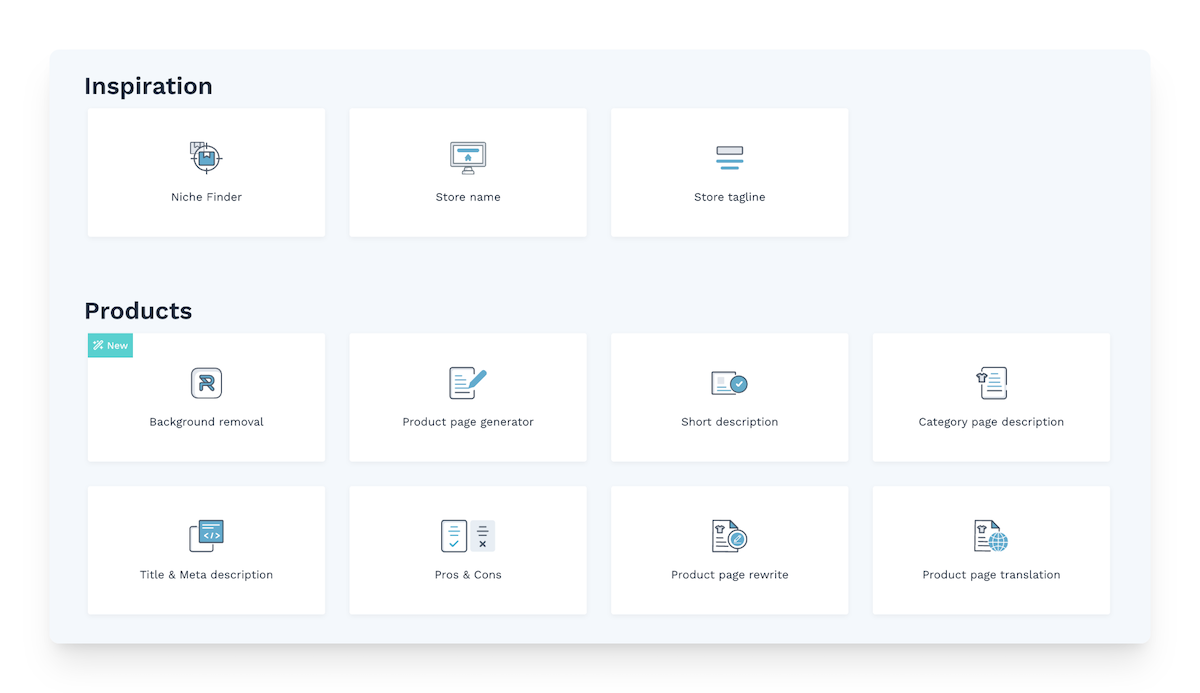
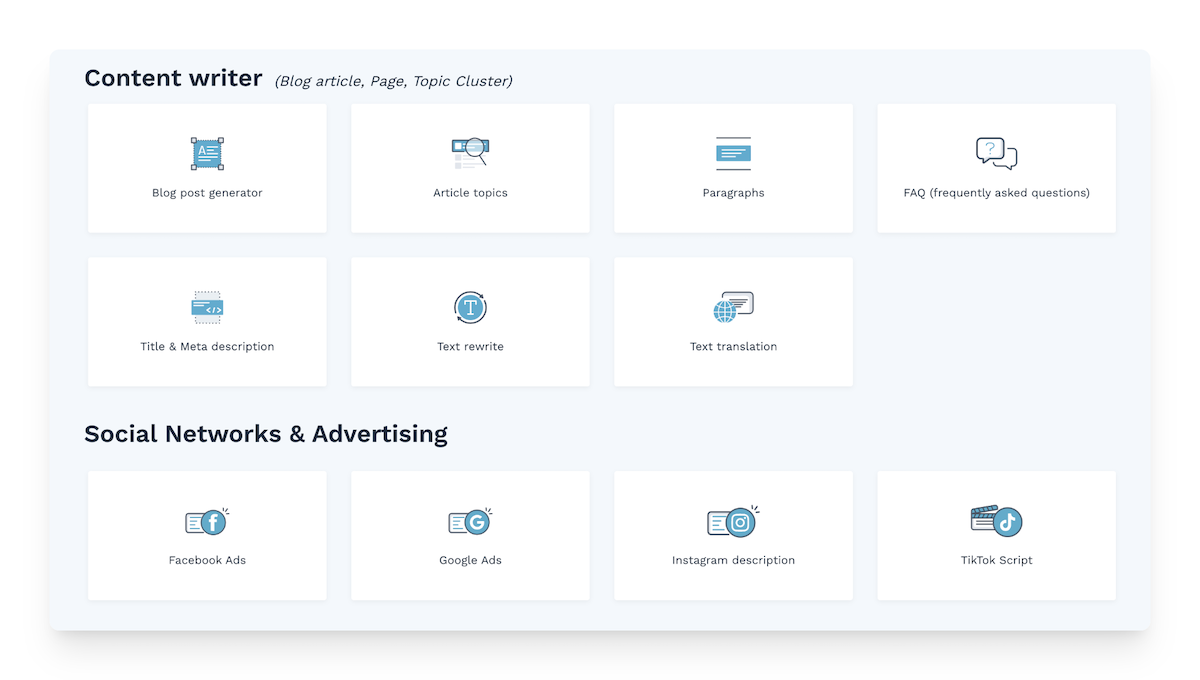
AI features available in your WiziShop dashboard
What’s more, this powerful tool is included in the price of your subscription and comes with unlimited access!
Test the solution free of charge for 7 days and discover the amazing benefits of artificial intelligence for your ecommerce site today!
Try WiziShop free for 7 days
THE EASIEST NO-CODE ECOMMERCE SOLUTION✅ No credit card required
✅ Access to all features
✅ No commitment
Note that AI still has a ways to go before it can be used completely free of human intervention to write content of the best quality. Regardless of what AI tool or platform you should, you should always review the generated content closely before posting or sharing it.
It's important to keep in mind that artificial intelligence doesn’t quite yet have the level of cultural understanding required to create, for example, a blog article personalized for a target audience. Furthermore, it doesn’t have that human empathy needed to connect and engage with readers on a personal level.
Nevertheless, you can still use AI tools to benefit your content creation, keeping the following tips in mind:
- Understand your goals: Clearly define your objectives for using AI for creating content, whether it's improving efficiency, generating ideas, or enhancing content quality.
- Choose the right tools: Select AI-powered platforms or tools that align with your specific needs, whether it's generating written content, designing graphics, or editing videos.
- Train and fine-tune: If applicable, train AI models with your own data to customize outputs according to your brand voice, style, or preferences. Continuously refine the models to improve accuracy and relevance.
- Combine human creativity with AI: While AI can automate certain aspects of content creation, human creativity remains invaluable. Use AI as a tool to enhance human creativity rather than replace it entirely.
- Quality control: Regularly review AI-generated content to ensure it meets quality standards and aligns with your brand guidelines. Make necessary adjustments or corrections as needed.
- Stay updated: Keep abreast of advancements in AI technology and content creation algorithms to leverage the latest features and capabilities for optimal results.
- Ethical considerations: Be mindful of ethical implications such as bias in AI-generated content and ensure compliance with data privacy regulations.
Following these tips can aid you in effectively harnessing the power of AI to streamline content creation processes, improve efficiency, and enhance the quality of your unique content offerings..
In addition, AI tools and software can be used to track consumer behaviors and preferences.
When you track this data across different areas, you can more easily craft content tailored to specific users and improve the overall user experience for your audience.
You can also use AI tools to audit the content you already have to see what posts are doing well and which could use some improvement.
By discovering what kinds of content boost your rankings on search engines, increase user engagement on social media platforms, best reach your target audience, and generate the most leads for your site, you can determine where your resources are best spent for future content creation.
12. Podcasts are growing in popularity
Do you have a favorite podcast you enjoy tuning in to week after week? If so, you're not the only one!
According to Backlinko data, the number of people listening to podcasts around the globe has seen an increase year after year, with 546.7 million podcast listeners worldwide being counted in 2024 and 651.7 million listeners predicted by 2027.
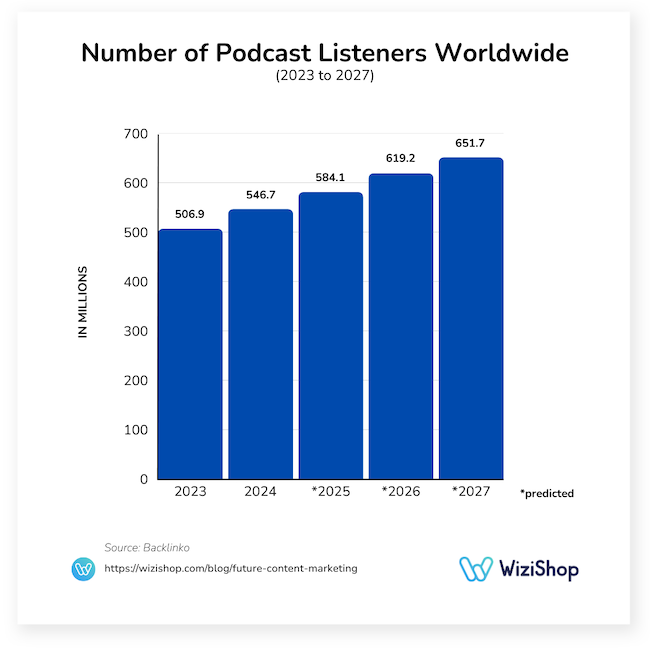
Marketers are definitely taking note of this!
Podcasts have emerged as a burgeoning trend in content marketing for several compelling reasons. To start, they offer a convenient and accessible way for audiences to consume content on-the-go, whether during commutes, workouts, or household chores.
Furthermore, podcasts provide a platform for marketers and brands to establish thought leadership, share expertise, and engage with their target audience in a more intimate and authentic manner. Additionally, podcasts foster a sense of community and connection, allowing listeners to form a deeper bond with the brand.
The Wild Ideas Worth Living podcast by REI
Launching and managing a podcast for your brand requires careful planning and execution.
First, define your podcast’s niche and target audience to ensure relevance and resonance. Next, invest in the best quality equipment and recording software your budget allows to deliver professional-grade audio content.
You’ll also want to develop a content calendar to maintain consistency and keep listeners engaged. Don’t forget to promote your podcast across various channels, including social media, email newsletters, and your website, to expand your reach and attract new listeners.
Finally, regularly solicit feedback from your audience to refine your content and improve the overall listening experience.
With strategic planning and dedication, a podcast can serve as a powerful tool for brand building, audience engagement, and content marketing success!
13. Live video streaming continues to be in demand
Live streaming has emerged as a pivotal content marketing trend for marketers in 2024 due to its unparalleled capacity to foster real-time engagement, authenticity, and connection with audiences.
As consumer preferences continue to evolve, live streaming offers a dynamic platform for businesses to humanize their interactions, showcase products or services, and build meaningful relationships with their target audience.
Live event with Nordstrom
Live video streams can take place on a variety of free and paid platforms, including social networks like Facebook, Instagram, TikTok, Twitch, and YouTube, as well as platforms designed specifically for streaming videos live, such as Dacast, Brightcove, and Kaltura.
This trend is likely to continue in the future as advancements in technology, particularly in the realm of AI, further enhance the live streaming experience.
AI-powered tools and algorithms can provide marketers with valuable insights into audience behavior, optimize content delivery, and even personalize live stream interactions in real-time, thereby maximizing engagement and driving conversions.
Marketers can leverage live streaming across various formats, including, for example, product demonstrations, behind-the-scenes glimpses, Q&A sessions, interviews, and virtual events.
By offering users diverse and compelling content in your live videos, you can cater to different audience preferences and capture attention in a competitive digital landscape.
For businesses venturing into live streaming, here are some key tips to maximize effectiveness with every live video stream:
- Plan and promote: Create a detailed plan for your live stream, including topics, format, and promotion strategy to build anticipation and attract viewers.
- Aim for authentic engagement: Interact with your audience in real-time, respond to user comments, and address questions to foster a sense of community and connection.
- Invest in quality equipment: Ensure that you have reliable internet connectivity, high-quality audio and video equipment, and adequate lighting to deliver a professional live stream experience for users.
- Be consistent: Establish a regular schedule for live streams to cultivate audience expectations and maintain engagement over time.
- Analyze and iterate: Monitor metrics such as viewership, engagement, and feedback to evaluate the success of your live streams and refine your strategy for future broadcasts.
Embracing live streaming as a core component of your content marketing strategy and harnessing the power of AI-driven insights will allow you to be able to more effectively engage audiences, drive brand awareness, and ultimately, achieve your marketing objectives in the digital era.
14. Email newsletters play a key role in content marketing
Email newsletters offer a direct, owned channel to reach audiences without relying on algorithms or third-party platforms.
With increasing privacy regulations and the decline of third-party cookies, brands are prioritizing first-party data—and email is a key part of that strategy.
Newsletters allow businesses to nurture relationships, deliver personalized content, and drive engagement with high intent.
These days, successful email marketing hinges on quality over quantity. Subscribers expect relevant, valuable content tailored to their interests, not generic sales pitches!
Brands that segment audiences, use engaging subject lines, and maintain a consistent, authentic voice see better performance. Interactive elements, storytelling, and strong calls to action also boost effectiveness.

Source: Really Good Emails
When done right, newsletters don’t just inform—they build community, trust, and long-term customer loyalty.
15. Brands are heading to online communities to generate ideas
Many brands are now tapping into online communities like Reddit, Discord, and Slack to generate content ideas and better understand their audiences.
Reddit, for instance, hosts countless niche forums (subreddits) where users share honest thoughts, questions, and feedback. By monitoring these conversations, marketers can identify trending topics, pain points, or questions that can inspire blog posts, videos, or social media content.
For example, a skincare brand might explore r/SkincareAddiction to find recurring concerns about ingredients or routines.
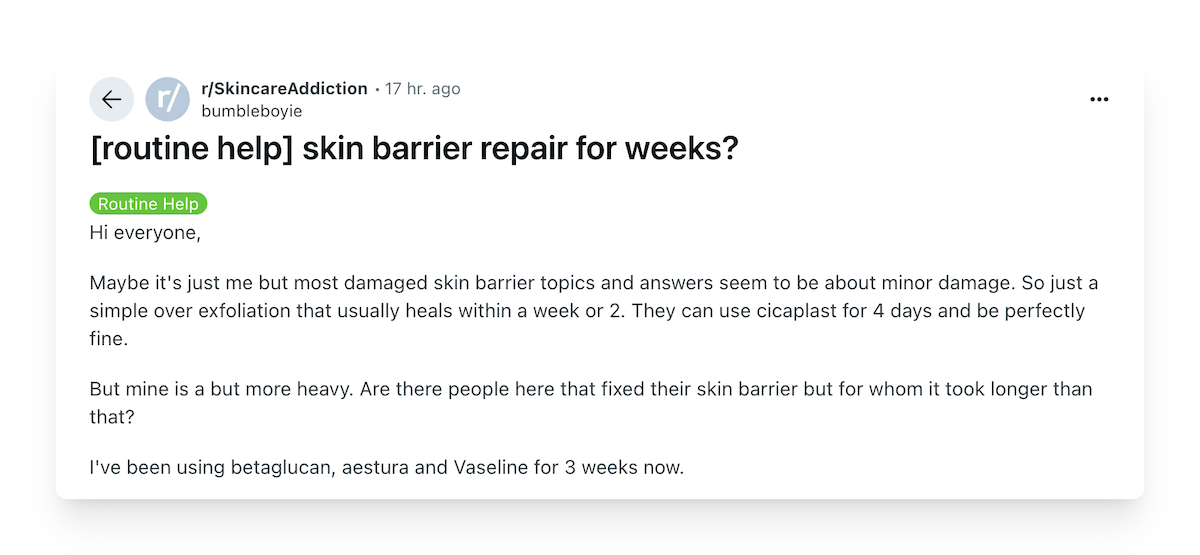
Source: Reddit
If many users express confusion about niacinamide and retinol, the brand could create an educational video or infographic explaining how to use them together safely. This approach ensures content is relevant, answers real questions, and builds credibility with potential customers.
Reddit’s authenticity and passionate communities offer a rich resource for idea generation. That being said, it’s essential to approach these groups respectfully and with a listening mindset, not just as means for promotion.










